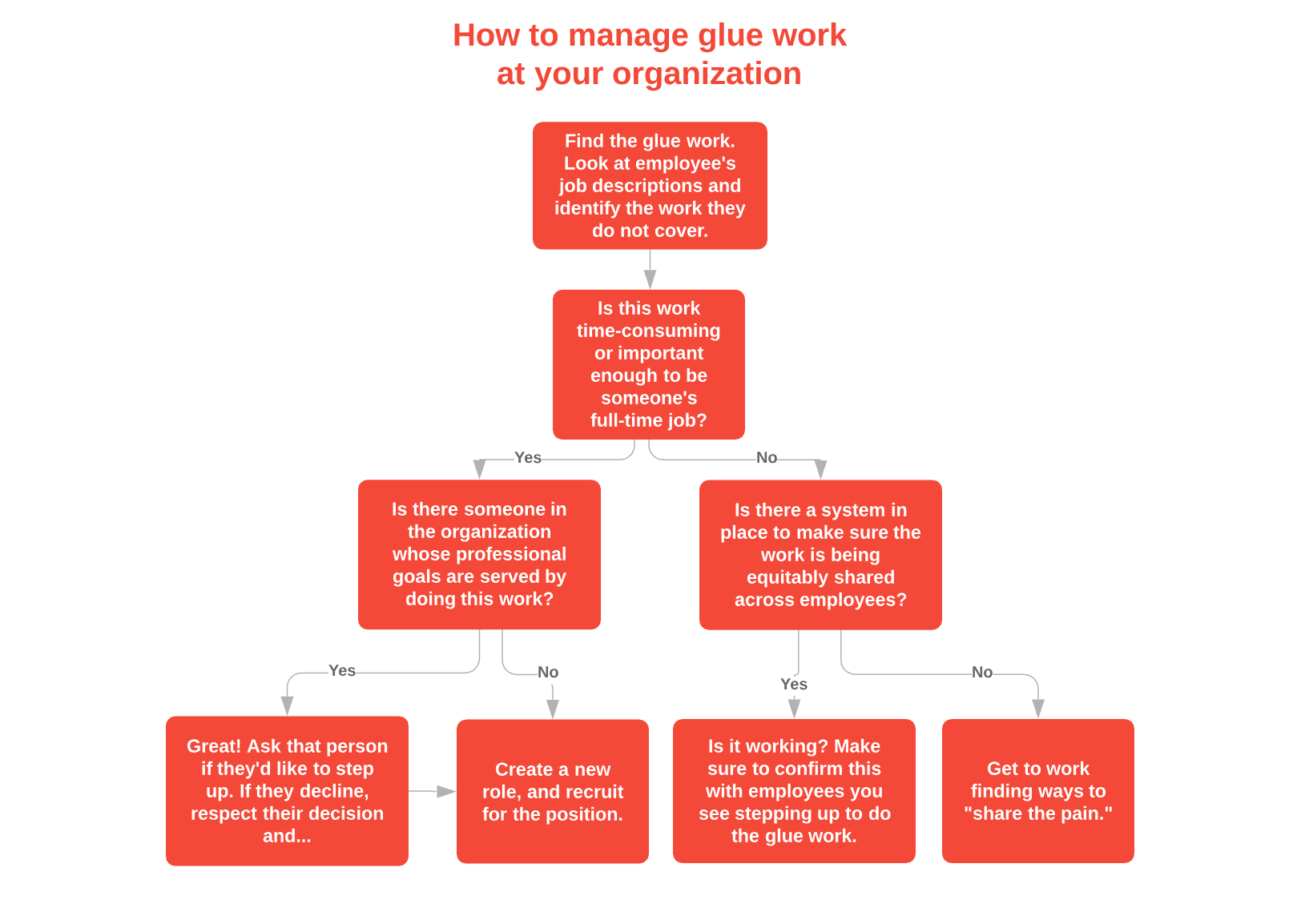
Glue work is stuff that needs doing, but falls outside of a job description. It can be critically important, but isn’t any specific person’s responsibility. Spending time on glue work has the potential to hamper your career development, as it takes time away from the work you presumably are evaluated by.
I learned of glue work from my colleague Elaine, who recently wrote an excellent post on Spin that I’m re-publishing below.
Elaine identifies practices which she believes mitigate glue work career risk at Atomic. In her examples, I see underlying principles and beliefs which have been a part of our company from the very beginning.
It’s easy, in my experience, to dismiss or misunderstand a practice when you don’t know where it comes from. Here are the principles and beliefs which I believe underly the practices Elaine describes below:
- The inherent worth and equality of all people
- The inherent worth of all work pursued with passion and care
- The only truly limited and valuable resource is time
- Hire smart people and trust them
- Generalists trump specialists
- Personal responsibility trumps management
I wonder if the philosophical roots above explain why Atomic has never been heavily oriented around job descriptions. Ours is a much more flexible approach than trying to perfectly title, with job descriptions, the messy plane of work that needs to be done. Loosely held job descriptions and culturally understood principles also create leadership and development opportunities for all Atoms.
Elaine’s post follows. I’d be interested to hear if you see the connection between the principles and beliefs above and the practices she identifies.
Who’s Doing the Glue Work at Your Company?
BY: ELAINE EZEKIEL
Lately, I’ve been thinking about the work that falls outside of job descriptions. I’m talking about the stuff that needs doing, but isn’t anyone’s explicit job.
I’m aware of how this type of work can impact my career, but Atomic has made that impact manageable—and sometimes even beneficial—through smart policies. I’ll share my story and offer some ways you can support workers at your organization.
My Story
As a teen, I worked in restaurants. Servers like me made less than $3 an hour—a “tipped minimum wage” supplemented by gratuities. Every night, my coworkers and I would stay 45 minutes after close to do “sidework.” We’d roll silverware and prepare the restaurant for the next morning’s shift. Sidework is necessary, but it didn’t seem fair that it was paid at the same low hourly rate which was supposed to be subsidized by tips. It was necessary; it was no one’s core job; it wasn’t appropriately compensated.
Seven years later, I left an all-women office to join an office of nearly all men at Atomic. As a marketer, I was also the only person in the office who wasn’t a professional software maker. Eager to make a good impression and prove my competence to my coworkers, I resolved to carefully study my job description and over-deliver on expectations.
But as in the restaurant world, I found that sticking to my explicitly defined job didn’t ensure that the workplace ran optimally. One morning, I walked into work and found a stack of dirty dishes next to an empty dishwasher. Normally, I like to pitch in when I see work that needs doing, but I felt nervous about being one of the only women and the only “non-technical” worker in the office stepping up to do that work. Standing in front of the sink, I pondered the right thing to do.
As I spent more time in the office, I happily noticed that my colleagues shared the work of washing dishes and similar jobs. But the dishes were the tip of the sidework iceberg. Other scenarios:
- A coworker is having a tough day and needs someone to talk to
- A new Atom is looking for someone to show them where we keep extra paper towels
- A colleague asks me if I have time to think of some ideas to spruce up the office’s design
- A manager needs someone to help run a soft-skills job interview
This sidework gave me contradictory feelings: I was eager to prove my competence to my new colleagues and flattered when people started turning to me for help. I was happy to help out when I saw a problem to address. I also recognized that my job description contained none of this work. I didn’t want to let this work overshadow my core job, even if I knew it was important.
Glue Work Defined
A colleague helped me clarify this concept when she shared a Slideshare about it on Slack. Squarespace Principal Software Engineer Tanya Reilly created a deck called “Being Glue.” In it, she discussed the phenomenon of women in the software field being passed over for promotions in technical roles after they were asked to manage the supportive aspects of the job. Her term for the work that holds it all together is “glue work.”
Reilly’s premise is that women volunteer or are asked to do the glue work more often than men, often to the detriment of their own technical contributions. The organization may function better with employees who engage in lots of glue work. But those employees are often passed over when it comes to promotion time because they haven’t focused as much on their core work.
This piece put words to something I’ve thought about throughout my whole working life. Reilly makes a convincing point that when left unaddressed, glue work makes life difficult, but I don’t feel like Atomic is taking advantage of me in terms of this kind of work. This made me want to investigate how Atomic manages to quell the problem of glue work, and to share these ideas with other, interested organizations.
What Companies Can Do
Reilly’s work tells us that companies can lessen the negative impact of glue work by following these steps:

Inspired by Tanya Reilly’s “Being Glue” Slideshare at: https://www.slideshare.net/TanyaReilly/being-glue
As for finding specific ways to share the pain, here’s what we’ve done at Atomic:
- Created a peer recognition program that celebrates and elevates the work of people who have stepped up to do extra work.
- Hired two wonderful office coordinators—Terri and Kelly—whose core job is to “set the stage” for client and employee success in our two offices. This is very different from the role of a professional cleaning crew, which Atomic also engages.
- Created the role of Delivery Lead. Deliver Leads’ core work is to focus on the experience of the client. This is a respected career in its own right (we’re hiring).
- Ensured that all Atoms have a mentor who helps them set and follow their professional development goals.
- Enshrined “Share the Pain” as an Atomic value.
- Established a policy to conduct a core competency interview for all job applicants. Among other soft-skill questions, we ask them to tell us a story of a time they’ve had to do a work outside their job description.
- Made all work trackable and payable by the hour. When Atoms go to Costco to purchase office snacks, they’re paid for that work. When Atoms take a walk with a coworker who needs to vent about a frustrating situation, that time is paid. When annual reviews come around, employees have hard data to show to their managers about their contributions through glue work.
- Fostered social bonds among Atoms through parties, pair lunches, and internal conferences that lower the social barriers to asking for help.
What Individuals Can Do
While companies can establish glue work policies and practices to set employees up for success, individuals should also meet their employers halfway. Here are some things you can do as an employee:
Understand and communicate your goals.
Each employee needs to understand her career goals and develop a rough idea of what she needs to achieve them. When these goals are shared with a career manager, the pair can identify any ancillary work that is getting in her way.
On the other hand, some sidework can be helpful. If you can frame your glue work in a narrative that makes sense to achieve your goals, then do it with panache! If not, opt out—or at least make sure the work is visible, documented, and compensated.
Understand that there’s no inherent hierarchy to work.
Passionate work is dignified work. Software development is not inherently more meaningful or more valuable than office coordination. It’s awesome to see someone who takes as much pride in her work as my office coordinator Kelly does, and it shows. She’s taken the space of her role and started managing office renovations, deftly juggling relationships with many service providers and greatly improving the hospitality of the office. When a client comes in for a kickoff meeting and finds a special plate with vegan offerings, that’s a huge value-add.
Have a sense of humor.
Yes, the stakes can feel very high in this discussion. But if you maintain awareness of these dynamics and communicate with your supervisor early and often, you’re not going to accidentally wake up one day in a career you hate. Doing the dishes or helping out a coworker in a pinch isn’t going to make or break your career. In fact, doing so speaks to your coworkers about your character and humility.
At the right employer, that might be seen as more important than ticking every box on your job description.
- Attention: Spending Your Most Valuable Currency - February 10, 2022
- Slicing the Revenue Pie in a Multi-Stakeholder Company - July 30, 2021
- Commercial versus Existential Purpose - July 19, 2021
- How I Misunderstood Mentorship and Benefited Anyway - June 16, 2021
- Sabbath Sundays and Slow Mondays - June 4, 2021

